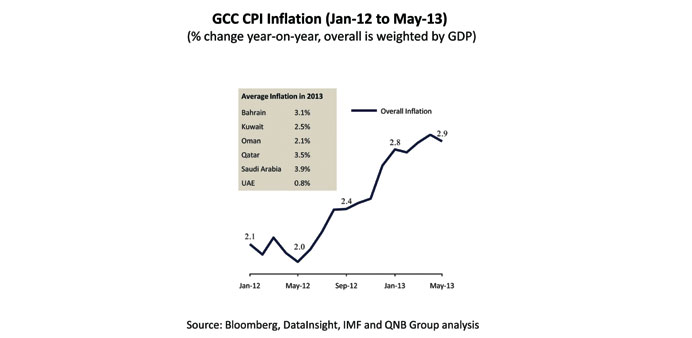|
|
QNB expects rents in Qatar to increase on the back of rental inflation which has already reached about 7% in June this year.
In its report, the bank forecasts some further increases in rents due to ramp up of several major projects over the next year or so, resulting in slightly higher inflation at 3.6% in 2013 and 3.8% in 2014.
Highlighting that inflation in Qatar has accelerated this year as influx of expatriates (to work on the roll out of major infrastructure projects) has driven up prices, QNB said rental inflation reached 6.7% in the year to June 2013, having been negative almost every month from early 2009 to mid 2012.
However, it said food inflation in Qatar has remained relatively flat at an average of 2.5% so far this year.
Elsewhere in the GCC (Gulf Co-operation Council) region, QNB said inflation is likely to “stabilise” at a moderate level around 3% mark in the near term as higher increases in housing costs are offset by lower food price rises.
This compares with global inflation average 3.8% and Middle East and North Africa inflation of 9.3% in 2013-14.
Historically, GCC inflation has been low until rising oil prices and an economic boom pushed inflation higher in the 2000s, it said.
Saudi Arabia accounts for almost half of the GCC economy and rising inflation there has been the main driver of price increases in the GCC, it said, adding food price inflation averaged 5.8% in the first six months of 2013 as local supply constraints pushed up prices despite falling global food indices.
Relative to the rest of the GCC, Saudi Arabia meets more of its food needs through domestic production, the report said.
Finding that housing inflation has slowed in Saudi Arabia as a major building programme has been rolled out, alleviating tight supply, QNB said these market forces are likely to remain in place resulting in inflation remaining close to the current level of 3.9%.
The UAE currently has the GCC’s lowest rate of inflation (0.8% year-on-year so far in 2013), despite strong growth in private demand, suggesting that persistent overcapacity on the supply side is holding back prices.
Rental inflation has averaged 1.3% so far this year as rents have stabilised in Abu Dhabi but have begun to rise in Dubai and the other emirates. “The new upward direction in housing costs and diminishing overcapacity should push overall inflation steadily higher to an average of 1.3% in 2013 and 2% in 2014,” according to QNB Group.
Rents in Bahrain have also increased rapidly, averaging 9.3% so far this year as they have bounced back from sharp falls in 2011 and 2012 when political instability shook the economy, it said.
Inflation in Kuwait has been moderate so far in 2013 with rents rising by 3.2% on average and food prices by 3.3%; while in Oman, rent and food inflation have been relatively stable at 1.2% and 2.2% respectively, it added.

